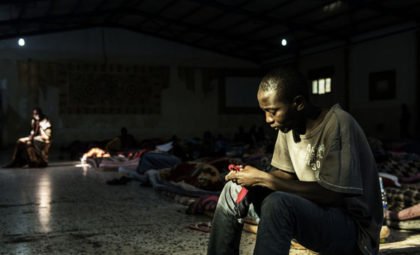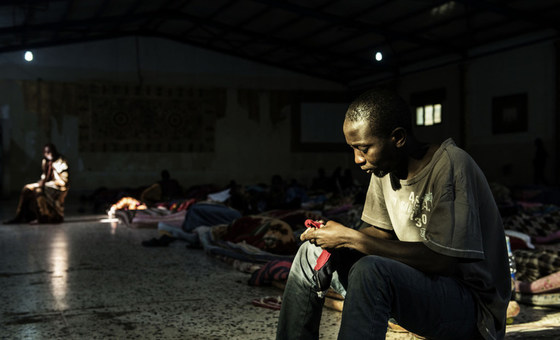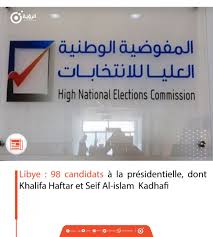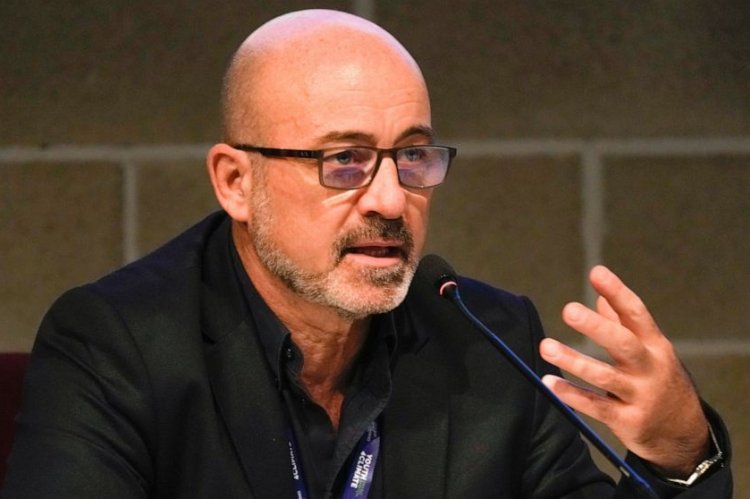 Migrants and refugees are being subjected to “unimaginable horrors” from the moment they enter Libya, throughout their stay in the country and – if they make it that far – during their attempts to cross the Mediterranean.
Migrants and refugees are being subjected to “unimaginable horrors” from the moment they enter Libya, throughout their stay in the country and – if they make it that far – during their attempts to cross the Mediterranean.
The bleak picture of “this hidden human calamity” was depicted in a report released on Thursday, by the United Nations political mission in Libya (UNSMIL) and the UN human rights office (OHCHR).
From unlawful killings, arbitrary detention and torture, to gang rape, slavery, and human trafficking, the report covers a 20-month period up to August 2018, and details a terrible litany of violations and abuses committed by a range of State officials, armed groups, smugglers and traffickers against migrants and refugees.
The findings are based on 1,300 first-hand accounts gathered by UN human rights staff in Libya itself, as well as from migrants who have returned to Nigeria, or managed to reach Italy, tracing the entire journey of migrants and refugees from Libya’s southern border, across the desert to the northern coast.
The climate of lawlessness in Libya provides fertile ground for illicit activities, leaving migrants and refugees “at the mercy of countless predators who view them as commodities to be exploited and extorted,” the report says, noting that “the overwhelming majority of women and older teenage girls” report having been “gang raped by smugglers or traffickers.”
Many people are sold from one criminal group to another and held in unofficial and illegal centers run directly by armed groups or criminal gangs. “Countless migrants and refugees lost their lives during captivity by smugglers, after being shot, tortured to death, or simply left to die from starvation or medical neglect,” the report says. “Across Libya, unidentified bodies of migrants and refugees bearing gunshot wounds, torture marks and burns are frequently uncovered in rubbish bins, dry river beds, farms and the desert.”
Those who manage to survive the abuse and exploitation and attempt the perilous Mediterranean crossing are increasingly being intercepted – or “rescued” as some claim – by the Libyan Coast Guard. Since early 2017, the approximately 29,000 migrants returned to Libya by the Coast Guard were placed in detention centers where thousands remain indefinitely and arbitrarily, without due process or access to lawyers or consular services.
The report points to the apparent “complicity of some State actors, including local officials, members of armed groups formally integrated into State institutions, and representatives of the Ministry of Interior and Ministry of Defense, in the smuggling or trafficking of migrants and refugees.”
“There is a local and international failure to handle this hidden human calamity that continues to take place in Libya,” said Ghassan Salamé, who heads UNSMIL.
The UN independent human rights expert on torture, Nils Melzer, estimates that, given the risks of facing human rights abuses in the country, transfers and returns to Libya can be considered a violation of the international legal principle of “non-refoulement”, which protects asylum seekers and migrants against returns to countries where they have reason to fear violence or persecution.
“The situation is utterly dreadful,” said the UN High Commissioner for Human Rights Michelle Bachelet on Thursday. “Tackling the rampant impunity would not only end the suffering of tens of thousands of migrant and refugee women, men and children seeking a better life, but also undercut the parallel illicit economy built on the abuse of these people and help establish the rule of law and national institutions.”
The report calls on European States to reconsider the human costs of their policies and ensure that their cooperation and assistance to the Libyan authorities be respectful of human rights, and in line with international human rights and refugee law, so they do not, directly or indirectly, result in men, women and children being trapped in abusive situations with little hope of protection and remedy.
afrique.latribune.fr
Lee Nak-yeon en Tunisie : la Corée du Sud veut charmer l’Afrique
Par Ibrahima Bayo Jr.
5-6 minutes
Economie
Stratégies
| 18/12/2018, 7:00 | 506 mots
Lee Nak-yeon, le Premier ministre sud-coréen rencontre aujourd’hui mardi 18 décembre, son homologue tunisien, Youssef Chahed.
Lee Nak-yeon, le Premier ministre sud-coréen rencontre aujourd’hui mardi 18 décembre, son homologue tunisien, Youssef Chahed. (Crédits : Reuters)
Historique! A Tunis comme à Séoul, on sait s’accorder sur le qualificatif de cette visite. Sous le sceau du cinquantenaire de l’établissement de leurs relations diplomatiques, Lee Nak-yeon, le Premier ministre de Corée du Sud entame à partir de ce mardi 18 décembre, une visite de deux jours à Tunis. Une porte d’entrée pour le Dragon asiatique qui veut charmer l’Afrique à coups de milliards de dollars. Détails.
A Tunis, on s’active autour des derniers préparatifs pour accueillir cet hôte de marque venu d’extrême orient. C’est la première fois, depuis l’établissement des relations diplomatiques entre Tunis et Séoul il y a 50 ans, qu’un Premier ministre sud-coréen se rend en visite dans la capitale tunisienne.
Au nom du cinquantenaire des relations tuniso-corénnes
A la tête d’une délégation d’hommes d’affaires et de facilitateurs institutionnels, Lee Nak-yeon, le Premier ministre rencontre ce mardi 18 décembre son homologue tunisien, Youssef Chahed. Ce n’est pas le seul point d’étape de cette visite de deux jours.
Le Premier ministre sud-coréen devrait aussi être reçu en entretien avec Béji Caïd Essebsi, le chef de l’Etat tunisien ou encore le ministre Mohamed Naceur et le président de l’Assemblée nationale. Au menu également, plusieurs signatures d’accords de partenariat notamment dans l’agriculture, l’industrie ou encore la technologie lors d’un forum tuniso-coréen destiné à renforcer la coopération de l’axe Tunis-Séoul fort d’un volume d’échanges de 200 millions de dollars
« Cette visite s’avère historique du fait qu’elle coïncide avec la célébration du 50e anniversaire de l’établissement des liens diplomatiques entre la Tunisie et la Corée du Sud», commente le gouvernement tunisien dans un communiqué. Elle « sèmera une nouvelle dynamique au sein des relations entre les deux pays d’autant qu’elle hissera la coopération bilatérale à un palier supérieur».
Pour le gouvernement tunisien, la Corée du Sud est un partenaire que l’on regarde comme un investisseur pour financer les projets du Plan quadriennal de développement de la Tunisie 2016-2020. Atomes crochus, puisque Cho Koo Rae, l’ambassadeur de la Corée du Sud en Tunisie assurait en septembre 2018 que son pays souhaitait porter au double le montant de ses investissements dans le pays. Sans dire que c’est pour contrer l’avance de la Chine, l’autre puissance montante dans le pays.
Une enveloppe de 5 milliards de dollars pour rêver d’Afrique
La Corée du Sud rêve aussi d’une extension de ses investissements dans tout le Maghreb. Lee Nak-yeon a pu caler dans son agenda une visite au Maroc (20 décembre 2018) et en Algérie. Le même schéma, signatures d’accords commerciaux et diplomatiques, devrait être reconduit.
Ces dernières années, la Corée du Sud rêve d’Afrique avec l’Afrique du nord comme porte de pénétration sur le marché continental. En mai dernier lors de la 6e Conférence sur la Coopération économique entre la Corée et l’Afrique (KOAFEC) à Busan, Kim Dong-yeon, Premier ministre adjoint, avait annoncé que son pays compte accorder une enveloppe d’investissements de 5 milliards de dollars à des projets de plusieurs pays d’Afrique entre 2019 et 2020.
Répartie en aide, financements ou prises de participation dans des entreprises africaines, cette enveloppe devrait être destinée en priorité à des projets ficelés dans les domaines des infrastructures électriques -au moins le cinquième de l’enveloppe-, de l’industrialisation ou encore des nouvelles technologies.



